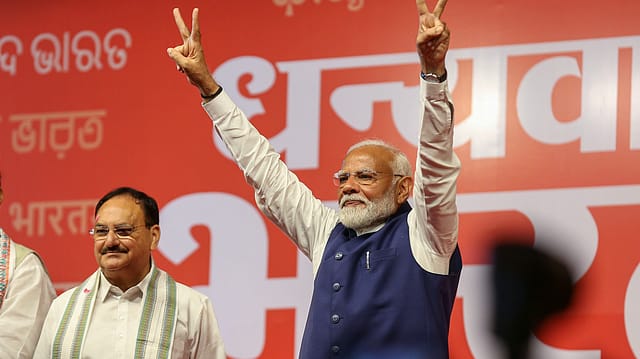Coalition, weak mandate could hurt ambitious reforms: Fitch
ADVERTISEMENT

Coalition politics and a weakened mandate for the National Democratic Alliance (NDA) could make it challenging to pass legislation on the more ambitious parts of the government reform agenda, according to Fitch.
The outcome of the Lok Sabha polls should support broad policy continuity, with the government continuing to prioritise infrastructure capex, improvements to the business environment, and gradual fiscal consolidation, says Fitch Ratings.
“The BJP fell short of a single-party majority in the 543-seat lower house of parliament for the first time since its latest period in government began in 2014, but we expect it to secure enough support from allied parties in the NDA to form a government with Narendra Modi remaining prime minister,” the rating agency says.
“We do not think that the government’s losses at the ballot box will lead to substantial policy adjustments, but the post-election budget in July should provide greater clarity on its economic reform priorities and fiscal plans over the coming five years,” it adds.
The government also increased public infrastructure investment significantly, helping to put India among the fastest-growing major economies in recent years, with real GDP growth reaching 8.2% in the fiscal year ending March 2024 (FY24), says Fitch. The rating agency expects growth to remain rapid at 7% in FY25.
“We expect India’s medium-term growth performance to remain around our trend estimate of 6.2% through FY28, despite the government’s slimmer majority,” it says.
The continued public capex drive to address infrastructure gaps, ongoing digitalisation efforts, and improved bank and corporate balance sheets - relative to the pre-pandemic situation - should facilitate a strong outlook for private investment, it notes. “We also expect the Production-Linked Incentives scheme to remain intact, which will help to attract FDI in target sectors, such as electronics. However, private investment has not yet accelerated meaningfully, which represents a risk for the outlook.”
Fitch believes major reforms to land and labour laws will remain on the new government’s agenda as it seeks to enhance India’s manufacturing sector, but these have long been contentious and the NDA’s weaker mandate will complicate their passage further. This could reduce the potential upside to India’s medium-term growth prospects, it says. “However, we believe such reforms will continue to advance at the state level in some parts of the country. There is also some potential for judicial reforms that would look to lower costs and speed resolution of court cases,” the rating agency says.
Weaker fiscal metrics relative to peers are a significant constraint for India’s sovereign rating, says Fitch.
This comes a day after Moody’s Ratings said it expects policy continuity with regards to budgetary emphasis on infrastructure spending and boosting domestic manufacturing, to support robust economic growth. The NDA's relatively slim margin of victory, as well as the BJP's loss of its outright majority in parliament, may delay more far-reaching economic and fiscal reforms that could impede progress on fiscal consolidation, said Moody’s.